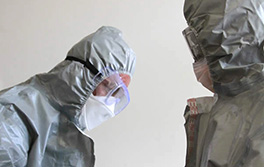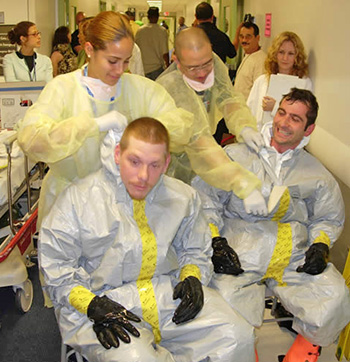Disaster Medicine
Given our central location in Brooklyn, and the number of highly publicized terrorist events and scares, which have affected the New York City area, disaster preparedness has become a vital function of the Department of Emergency Medicine. Currently, our division coordinates disaster preparations for both SUNY Downstate Health Sciences University and Kings County Hospital Center. This includes arranging necessary equipment and overseeing disaster contingency planning for both hospitals, as well as implementing periodic drills involving both nearby healthcare facilities and city agencies.
The Disaster Preparedness Division also provides training to hospital staff in various areas of emergency management and preparedness. Research opportunities in disaster medicine are also available through the division for attending physicians, residents and medical students as well as other interested parties.

Contact Information
440 Lenox Rd, 2M
Brooklyn, NY 11203
Phone: (718) 270-1168 / 3216
The New York Institute for All Hazard Preparedness

SUNY Downstate Health Sciences University is also part of the New York Institute for All Hazard Preparedness (NYIAHP). This organization is based at SUNY Downstate and consists of several other nearby healthcare facilities (Kings County Hospital Center, Kingsboro Psychiatric Center, and Kingsbrook Jewish Medical Center). The NYIAHP is dedicated to the disaster preparedness of both the member facilities and their surrounding neighborhoods and continues to be responsible for some of the largest civilian disaster drills in the country. These drills take place every 6 to 18 months and involve, not only the facilities and local city agencies but also the participation of community members of all ages
International Service
EurAsian Congress on Emergency Medicine, Antalya Turkey.
New York Coordinator, Sonosite School in All India Institute for Medical Science
EM-TECH (INDO-US Emergency Medicine & Trauma Education Center for Health)
January 18–20, 2008, and March 1–3, 2009–2012
Academic Chairperson, INDO-US Emergency Medicine & Trauma Education Center for Health
Development of Disaster Preparedness Curriculum
For cities of Mumbai and Borada, India, September – October 2007, Disaster Workshop
and Tabletop Drill. Funded by the federal Government of India.
Disaster Medicine Curriculum,
Indo-US Emergency Medicine Summit 2006, 2007 & 2008 Chairperson of Disaster Preparedness
Section, “Disaster Medicine Curriculum,” “New Dilemmas in Triage,” “Hospital Preparedness
and Planning,” “Hospital Disaster Planning Workshop,” “World Trade Center Response
Highlights,” “Cognitive Thinking in Emergency Medicine Education,” All India Institute
for Medical Sciences, New Delhi India, September 27 – October 1, 2006, Mumbai India
October 2007, Baroda India, October 2007.
For more information on the INDO-US Emergency and Trauma Collaborative, please visit the official website.
The Medical Student Support Team
Disaster Preparedness isn't just a hot topic; it is a necessary component of all medical training. We, at the Division of Disaster Preparedness, provide medical students with disaster preparedness training and techniques. To that end, we’ve established a Medical Student Support team. Through this volunteer group, we provide medical students with opportunities to play an active role in disaster activities, giving them a taste of what to expect, both in responding to a disaster, and in managing its effects.
Protect New York
The significant risks that New York State faces from terrorism and other disasters will challenge us for generations. To create and disseminate knowledge on ever better ways of protecting ourselves, New York must foster excellence in research, education, and public service. Founded at SUNY Downstate Health Sciences University, in Brooklyn, NY on April 24, 2006, Protect New York is dedicated to helping New York State and New York City meet this challenge.
Though most of the founding members are faculty members from the State University of New York system, Protect New York welcomes membership inquiries from full- or part-time faculty members and academic administrators in any accredited college or university, and also from emergency management and homeland security professionals (who are interested in research and education), and college students.